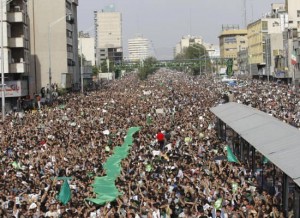 Much has transpired since last year’s historic U.S. Presidential elections. The dramatic real-time run-up to November 4 kept many of us totally tethered to our digital news screens.
Much has transpired since last year’s historic U.S. Presidential elections. The dramatic real-time run-up to November 4 kept many of us totally tethered to our digital news screens.
Since then, that frenetic and insatiable state of political engagement has pretty much dissipated…until last week.
The prospect of a Twitter/SMS/blog-fueled Presidential election to overthrow the Holocaust-denying, WMD-seeking, woman-oppressing, propagandizing Iranian dictator brought back (at least for me) emotions not felt since David Axelrod and co. overthrew the Bush-Cheney-Rumsfeld-Rice juggernaut.
But unlike in America where the powers-that-be could manipulate, though not silence, the public discourse, the Iranian mullahs and military executed their election coup d’etat while keeping dissidence to a twitterful minimum. Did it work? (Well, let’s just say Iran isn’t China.)
I honestly didn’t hold out much hope for regime change, and tweeted the following on Friday:
PeterHimler Even if Ahmadjinedad gets trounced, will the world ever know? Does anyone believe he’ll cede power? Think Zimbabwe.
3:01 PM June 12th Power Twitter
The state-decreed election results set in motion massive demonstrations in Tehran and elsewhere. The media punditry, as expected, ratcheted up the debate on the relative value of competing media for their respective reporting (where possible) and ability to mobilize.
One popular Twitter hashtag was #CNNfail, which alluded to CNN’s supposed less-than-stellar coverage of Iran’s staged election. A burka-outfitted Christiane Amanpour, the network’s star correspondent, was quashed by the defiant dictator during his first post-election presser. Others begrudgingly acknowledged the first-rate journalism emanating from the so-called dying breed of ink-stained journalists, which refreshingly included New York Times executive editor Bill Keller reporting from Tehran.
But most continued their anointment of Twitter (and live bloggers) as the predominant drivers that enabled a disenfranchised electorate to band together after the government shut down the other people (and mainstream)-powered media platforms.
 In a Howard Beale moment, it was Twitter that sent Tehranians to their rooftops to proclaim “death to the dictator.” And it was Twitter that enabled the oppositon rally on the streets of Tehran today.
In a Howard Beale moment, it was Twitter that sent Tehranians to their rooftops to proclaim “death to the dictator.” And it was Twitter that enabled the oppositon rally on the streets of Tehran today.
There’s no denying the power of this microblogging platform. Yet, there’s also no denying the power of “trained journalists” doing what they do best to put in perspective the facts that flowed fast and furious from the Farsi fiefdom.
Don Tapscott tweeted his take today:
DonTapscott Iran demos and riots: Demographics (huge youth pop) and tech (web 2) = access to secular information = social explosion. Just the beginning